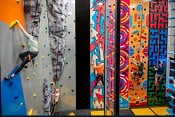In reply to Pesda potato:
Your question is too vague to really answer properly.
To make physical gains In strength or endurance you need to work to a certain level of fatigue, yes.
That level differs according to your objective. To improve power endurance you generally work to a stage where you're reslly quite pumped then rest a few minutes then repeat a number of times; I find I work until I'm really quite tired. To improve strength then you should be doing less volume, but still training a bit beyond the point where you feel your performing less well than when fresh. For power you should stop as soon as you feel an attempt was worse than the previous one due to fatigue.
The above are purely physical considerations. However, when tired your ability to learn technique is really impaired. So I'd say that it's also important not to train to the point where you're flailing, as that increases injury likelihood, degrades technique, and means more rest before you can train again.
The knack is in balancing the above two competing prioirities









